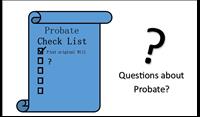|
|
Probate
Tuesday, October 4, 2022
Everything’s bigger in Texas, including family feuds. Feuds over a wealthy family member’s estate is a spectator sport, especially as all court filings are public record. These lurid Houston probate cases filled our newspapers with tales of murder, will forgeries, and false spouses or children.
- The Estate of William Marsh Rice: Millionaire William Marsh Rice signed an 1893 Will granting a sizeable share of his estate to the Rice Institute. Rice’s attorney, Albert T.
Read more . . .
Thursday, September 29, 2022
When I assist my clients with their estate plan or a probate, I am often asked what a word means in “plain English”. Reading your Will shouldn’t require you to have a legal education, so below I’ve defined common legal terms used in Wills or probate in “plain English”.
- Per Stirpes – a Latin phrase referring to the distribution of your estate if one of your beneficiaries, such as a child, predeceases you.
Read more . . .
Wednesday, May 11, 2022
If you or someone you know has experienced the Texas probate process after a loved one’s death, then you know that probate involves hiring an attorney, appearing before a judge, and several months of administration. Probate may even last several years because of a beneficiary or creditor contest, resulting in your inheritance being spent down by attorney’s fees.
Even if you have a Will, your assets will not automatically transfer to the beneficiary upon your death. Instead, the Will must be approved by a judge and go through probate administration in order to transfer title to your assets to your beneficiaries. In addition, the Will is considered public record, so anyone with internet access could view your probated Will online or request a copy from the county clerk. Read more . . .
Wednesday, March 10, 2021
Probate Myth #1: My spouse died, but I don’t have to go through probate to transfer the house or car because it’s owned in both of our names, so it all automatically passed to me.
This is the most common probate myth, and it possibly the most damaging one. In Texas, property purchased between two people (such as a husband and wife) does not transfer automatically to the surviving owner after death of an owner unless the deed also includes language that the property was purchased with rights of survivorship. This is very rare when buying a house, because most title companies will issue title into the husband and wife’s name as tenants in common, without mention of survivorship rights.
What does this mean? Let’s say that Husband (H) and Wife (W) bought a house together during marriage. Read more . . .
Thursday, February 16, 2017
 During the estate planning process, your attorney will draft a number of legal documents such as a will, trust and power of attorney which will help you accomplish your goals. While these legal documents are required for effective planning, they may not sufficiently convey your thoughts and wishes to your loved ones in your own words. A non-binding letter of instruction is a great compliment to your “formal” estate plan, allowing you to outline your wishes with your own voice. There is no set format as to what to include in this document, though there are a number of common themes. First, you may wish to explain, in your own words, the reasoning for your personal preferences for medical care, especially near the end of life.
Read more . . .
Wednesday, August 24, 2016

Things to Consider When Picking an Executor
When picking an executor, it is important to consider the role and responsibilities of the position. The role of an executor is to carry out a deceased person’s wishes as declared in a Will after he or she has passed on. The executor’s responsibilities include the distribution of assets according to the Will, the maintenance of assets until the Will is settled, and the paying of estate bills and debts. The following issues should be considered when choosing an executor:
Competency: The executor of an estate will be going through financial and legal documents and transferring assets from the decedent to the beneficiaries. The executor must make all necessary court appearances. There is no requirement that the executor have any financial or legal training, but familiarity with these areas does avoid the intimidation felt by lay people, and potentially saves money on professional fees.
Trustworthiness: The signature of an executor is equivalent to that of the decedent. The executor has full control over all of an estate’s assets. He or she will be required to go through all the papers of the deceased to confirm what assets are available to be distributed. The executor handles all assets, pays the debts, handles the tax returns and eventually, distributes the estate assets. Because of the high level of trust required of this position, it is extremely important to choose a person with great integrity to handle your estate.
Availability: The work of collecting rents, maintaining property, and paying debts can take more than a few hours a week. Selecting an executor with significant obligations to work or family may cause problems if he or she does not have the time available to devote to the task. If an executor must travel great distances to address issues that arise, there will be more of a time commitment necessary, not to mention greater expenses for the estate.
Family dynamics: Selection of the wrong person to act as executor can create resentment and hostility among an estate’s heirs. Consider how family members interact with one another and avoid picking someone who may provoke conflict. Even the perception of impropriety can lead to a lawsuit, which will serve to take money out of the estate’s coffers and delay the legitimate distribution of the estate. You may want to consider a corporate trustee or third-party trustee to minimize conflicts. Taking time to consider the responsibilities of the executor is an important part of the Estate Planning process. Gain peace of mind by making these decisions while you have the opportunity.
Thursday, April 7, 2016
 When planning your estate, you must consider how you hold title to your real and personal property. The title and your designated beneficiaries will control how your real estate, bank accounts, retirement accounts, vehicles and investments are distributed upon your death, regardless of whether there is a will or trust in place and potentially with a result that you never intended. One of the most important steps in establishing your estate plan is transferring title to your assets. If you have created a living trust, it will not function as intended if you fail to transfer the title on your accounts, real estate or other property into the trust. Unless the assets are formally transferred into your living trust, they will be subject to probate.
Read more . . .
Wednesday, November 11, 2015
 Family dynamics are a complex matter. Each family has its own set of values and experiences. It is not uncommon that parent’s and grandparent’s intentions when leaving an inheritance can be misunderstood by their children and grandchildren. This is particularly true in cases where the inheritance left appears unequal or if there is a blended family situation. In any family, there are many benefits to taking time to explain your values and also your intentions in your Estate Plan. There are many ways to accomplish this, three of which are discussed in this article. One avenue of explaining beneficiaries’ inheritance is to include specific writing in your Will or Trust document. A section dedicated to the intent behind the document helps to create common understanding between you, the Grantor, and your beneficiaries. Another option which is more personal is to write a letter to all or each of the beneficiaries. That can go a long way to ease tensions or disagreements. Writing a personal letter can be particularly meaningful to children and grandchildren. Consider utilizing this letter to encourage positive character traits and values you see in your loved one as you also describe your intent in their inheritance. While the Estate Planning documents or letters accompanying the documents are beneficial, one of the most effective ways to avoid family division or tension is to have family meetings and communicate clearly during your lifetime. The more intentional and open your communication, the more clearly your actions and decisions will be understood. The setting and structure of family meetings will look quite different based on each family’s make-up. Whether meeting altogether or one-on-one, the main goal is to communicate openly. Family division due to inheritance is avoidable. Be encouraged that even small steps to communicate and express your thoughts creates depth of understanding between the generations. Focus on the relationships and the values you hope to inspire in those you love.
Friday, August 7, 2015
 Some people believe that if they have a Will, then no probate is necessary. Quite the opposite is true. Generally, only a properly funded living trust can avoid probate. If there is a Will, the Deceased’s estate will go through a court-managed process called probate. What is probate? Probate is basically a process where the Will is examined by the court to determine if it is valid under Texas law, to prove up the facts of death, and to appoint an Executor who will manage and distribute the assets under the terms of the Will.
There are many different types of probate. This article discusses the usual form of probate proceeding where there is a Will and no one contests it. But there are other types of probate proceedings to streamline transfer of title to property and also for those individuals who pass away without a Will.
For the standard probate proceeding with a Will, the process involves the following steps:
- Application is filed with proper court requesting admission of Will into probate and requesting appointment of Executor for estate administration.
- Public notice is sent that Applicant (usually Executor named in Will) is seeking to probate Will.
- Short hearing is held in front of judge with Applicant testifying as to facts of death, that Will submitted has not been revoked, and that Applicant is qualified to be Executor.
- After the hearing, Applicant is sworn in as Executor and will receive Letters Testamentary. Letters Testamentary are proof to others the Executor is acting with the authority of the court to handle the estate. With Letters Testamentary, the Executor can sell assets, transfer title to assets, and sign tax returns and other legal documents on behalf of the estate.
- Notice Will admitted to probate and of appointment of Executor is sent to all beneficiaries, enclosing copy of the Will.
- Inventory and appraisal of estate assets is prepared, with copies supplied to all beneficiaries and an affidavit of compliance filed with the court.
- Payment of estate debts to rightful creditors.
- Executor sells assets or retitles assets into names of beneficiaries.
-
Income Tax Return and Estate Tax Return prepared and taxes paid, if applicable.
- Final distribution of assets to beneficiaries.
Wednesday, November 28, 2012
7860.jpg)
What happens if you are bequeathed a car that no longer exists? The ABCs of Ademption
If you’re involved in settling a loved one’s estate, you may come across the curious word “ademption”. Ademption describes what happens when something designated in a will no longer exists. For example, your uncle dies and leaves you in his will an old-school Harley Davidson motorcycle. However, if your uncle crashed the motorcycle two years before the will was probated and there’s nothing to leave, then that gift would be considered adeemed and you would receive nothing. This is why certain wills include language that says, “if owned by me at my death.”
However, it is important to realize that certain items cannot be adeemed, such as money. For example, if your uncle died and left $7,000 for you in his will, but left a zero dollar balance in his accounts, your gift of cash would not be adeemed. Instead, the estate would be responsible for satisfying that gift, for example, through the sale of the house or other such property.
There are exceptions to ademption, however, so please consult a qualified probate lawyer if you want to learn more about ademption and its exceptions.
Wednesday, August 8, 2012
9632.jpg)
Do Heirs Have to Pay Off Their Loved One’s Debts?
The recent economic recession, and staggering increases in health care costs have left millions of Americans facing incredible losses and mounting debt in their final years. Are you concerned that, rather than inheriting wealth from your parents, you will instead inherit bills? The good news is, you probably won’t have to pay them.
As you are dealing with the emotional loss, while also wrapping up your loved one’s affairs and closing the estate, the last thing you need to worry about is whether you will be on the hook for the debts your parents leave behind. Generally, heirs are not responsible for their parents’ outstanding bills. Creditors can go after the assets within the estate in an effort to satisfy the debt, but they cannot come after you personally. Nevertheless, assets within the estate may have to be sold to cover the decedent’s debts, or to provide for the living expenses of a surviving spouse or other dependents.
Heirs are not responsible for a decedent’s unsecured debts, such as credit cards, medical bills or personal loans, and many of these go unpaid or are settled for pennies on the dollar. However, there are some circumstances in which you may share liability for an unsecured debt, and therefore are fully responsible for future payments. For example, if you were a co-signer on a loan with the decedent, or if you were a joint account holder, you will bear ultimate financial responsibility for the debt.
Unsecured debts which were solely held by the deceased parent do not require you to reach into your own pocket to satisfy the outstanding obligation. Regardless, many aggressive collection agencies continue to pursue collection even after death, often implying that you are ultimately responsible to repay your loved one’s debts, or that you are morally obligated to do so. Both of these assertions are entirely untrue.
Secured debts, on the other hand, must be repaid or the lender can repossess the underlying asset. Common secured debts include home mortgages and vehicle loans. If your parents had any equity in their house or car, you should consider doing whatever is necessary to keep the payments current, so the equity is preserved until the property can be sold or transferred. But this must be weighed within the context of the overall estate.
Executors and estate administrators have a duty to locate and inventory all of the decedent’s assets and debts, and must notify creditors and financial institutions of the death. Avoid making the mistake of automatically paying off all of your loved one’s bills right away. If you rush to pay off debts, without a clear picture of your parents’ overall financial situation, you run the risk of coming up short on cash, within the estate, to cover higher priority bills, such as medical expenses, funeral costs or legal fees required to settle the estate.
The Dean Law Firm, PLLC assists clients in Sugar Land, TX and throughout Houston in Fort Bend County and Harris County.
|
|
|
|